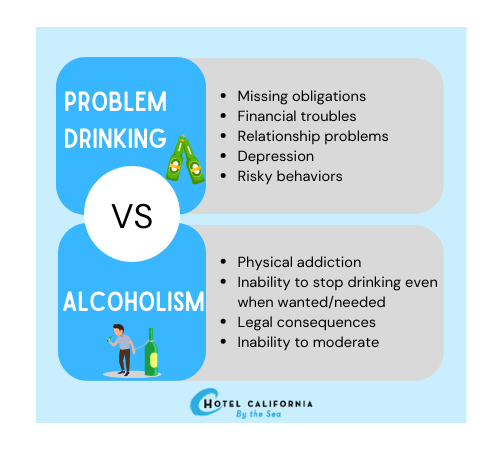Can an Alcoholic ever drink again?
Alcohol use disorder, alcohol addiction or alcoholism can be a very difficult disease to overcome. Depending on the severity of the addiction, it can take months and even years for someone to recover. But once they have recovered, is it possible to drink in moderation again? Does moderation work? Can a person actually relearn how to drink responsibly after a long period of abstinence from alcohol?

The majority of alcohol recovery treatment programs practice and recommend complete abstinence. However, abstinence-only programs don’t work for everyone. There are some alcohol users who are referred to as “gray area” drinkers. These people are able to cut back on their drinking or change their drinking habits without quitting completely. Ultimately very few people who have become addicted to alcohol or have experienced alcohol problems and have recovered are able to drink again.
Can an Alcoholic ever drink again? According to the Harm Reduction Method, Yes.
Alcohol abuse alters your brain chemistry. Once the brain has adapted to the alcohol, quitting can become difficult. It can also make it more difficult to control any drinking habits. Some people who have mild to moderate alcohol problems are able to use harm-reduction techniques to help manage their drinking habits. Harm reduction techniques can be beneficial for people who do not have an alcohol use disorder or an addiction.
The harm reduction method recognizes that it is not possible or even necessary to quit drinking completely. It works by teaching people to be more mindful of their drinking habits. One harm reduction method includes joining a Moderation Management program (MM). People who participate in Moderation Management must complete a 30-day period of complete alcohol abstinence. During this time, members will learn different strategies for identifying and controlling triggers, adapting healthy drinking behaviors, and developing new activities to replace drinking. Members will also learn effective ways to manage future drinking habits.
Moderation Management believes in taking a more realistic approach to drinking. It helps users better understand the reasons for their drinking and how to change them. The Moderation Management program is the most effective in people who have questionable drinking behaviors but do not necessarily meet the criteria for moderate to severe alcohol use disorder. However, it is generally not effective for users who have an alcohol use disorder.
Why does Moderation Management not work for people who have an alcohol use disorder? People with alcohol use disorder can experience withdrawal symptoms when they try to reduce alcohol intake. These symptoms include anxiety, depression, difficulty thinking, fatigue, insomnia, mood swings, elevated blood pressure, loss of appetite, rapid heart rate and tremors. People with alcohol use disorder can quickly forget the downsides of drinking including hangovers and blackouts. Once people with alcohol use disorder begin drinking again, they may not have the capacity to stop or control their drinking.

Can an Alcoholic ever drink again? According to complete Abstinence programs, No.
The majority of alcohol treatment programs practice complete abstinence from alcohol. They believe that once a person has crossed the boundaries of irresponsible and dangerous alcoholic drinking, they will never be able to turn back. According to the peer support addiction program Alcoholics Anonymous, once a person becomes an alcoholic, they will never be able to fully control their drinking for any length of time. And to overcome their addiction, they must remain completely sober.
Despite having successfully abstained from alcohol for months or years does not qualify a person to go back to drinking normally again. Some people believe that after a certain amount of time, it may be safe to drink again. According to complete abstinence programs, this thought can be dangerously misleading. It can make it seem as though drinking casually is acceptable when in reality, any type of drinking can quickly lead to out-of-control and negative drinking habits and behaviors.
What is Alcohol Addiction?
Alcohol addiction is a chronic and relapsing mental health disorder. Alcohol misuse falls under the conditions of alcohol abuse, alcohol dependence or alcoholism. It is associated with compulsive alcohol behaviors and loss of control over alcohol intake. Alcoholism is a spectrum disorder. It can range from mild to moderate to severe.
Alcohol has a powerful effect on the brain. It can produce pleasurable feelings while blunting out negative emotions by enhancing the feelings associated with alcohol. The rewarding effects will slowly increase brain activity related to reward processing in the brain.
Over time, alcohol use can lead to progressive changes in the brain physically and chemically. This can compromise brain function and drive the brain from controlled occasional alcohol use to a more difficult-to-manage chronic misuse. Alcohol abuse is habit-forming and can make it more difficult to stop drinking. When drinking patterns are constantly repeated, the brain will begin to change its patterns and sequence of actions to involve drinking. This turns into a habit. It turns into an incentive salience and changes the brain chemistry. This also makes it more likely for a person to continue their drinking patterns and eventually make it difficult to stop.
Alcohol misuse can initially and only temporarily reduce a person’s negative emotional state by dampening activity in the extended amygdala. However, this can lead to tolerance and the need for more substances to alleviate those painful feelings the users were trying to block. When alcohol is not constantly present, the pain tolerance is lowered and users can begin to feel even more emotional pain. This motivates the brain to continue drinking.
Check Your Insurance Coverage for FREE
Find out if your insurance covers addiction treatment in minutes. We accept most insurance!
Stages of the Alcohol Addiction Cycle
- Binge and intoxication Stage. During this stage, alcohol rewards, gives incentive salience and develops pathological habits. Alcohol users often experience rewarding effects of alcohol such as euphoria and reduction of anxiety. The repeated activation of the area of the brain called the basal ganglia’s reward system reinforces alcohol-drinking behaviors. This increases the likelihood of more alcohol consumption. The basal ganglia is important in motivation and the formation of habits and other routine behaviors. Repeated alcohol consumption can result in changes in the basal ganglia that eventually lead to the development of a new habit formation of alcohol abuse.
- Negative effects and the withdrawal stage. During this stage, users experience reward deficits and stress surfeit. During the withdrawal stage of alcohol addiction, a person will experience the negative symptoms of alcohol withdrawal when they stop drinking. Physical and psychological symptoms include insomnia, anxiety and emotional pain. The negative emotions often associated with alcohol withdrawal come from the diminished activation in the reward system of the basal ganglia. This can make it difficult for a person to experience pleasure and activate the stress system. When the stress system becomes activated in the extended amygdala, it can contribute to feelings of anxiety and irritability.
- Preoccupation and anticipation stage. During this stage, users will experience cravings, impulsivity and changes to the executive function. Alcohol users will often crave and have urges to seek out alcohol use again after a period of abstinence. This usually happens in the prefrontal cortex area of the brain, which is responsible for executive functions including the ability to organize thoughts, prioritize tasks, manage time and make decisions.
Reach out to Hotel California by the Sea
We specialize in treating addiction and other co-occurring disorders, such as PTSD. Our Admissions specialists are available to walk you through the best options for treating your addiction.
Are you looking for Alcohol Addiction Treatment?
Alcohol addiction can be a very difficult condition to overcome. People often wonder if they will ever be able to drink again after successful recovery treatment. Because of alcohol’s impact on the brain and body, alcohol addiction can leave lasting damage physically and psychologically. And even the smallest amount of alcohol can send a person back into a dangerous cycle of alcohol abuse. It is the reason why most treatment methods practice complete abstinence.
The most effective way to treat alcoholism is through alcohol use disorder treatment programs, which provide various treatment methods including cognitive therapies and medication management.
Hotel California by the Sea provides a multifaceted approach to alcohol addiction treatment which includes individual therapies and medication-assisted treatments. Evidence-based treatments include CBT, DBT, and EMDR therapy. We also provide all levels of treatment care including detox, residential, PHP and IOP. Hotel California is dedicated to helping clients in all stages of addiction recovery.
References:
https://drewhorowitzassociates.com/2024/01/22/can-an-alcoholic-ever-drink-again
https://www.aa.org/faq/can-alcoholic-ever-drink-normally-again
https://www.niaaa.nih.gov/publications/cycle-alcohol-addiction
https://riahealth.com/blog/can-an-alcoholic-ever-drink-normally
https://www.verywellmind.com/can-alcoholics-learn-to-drink-moderately-67719
